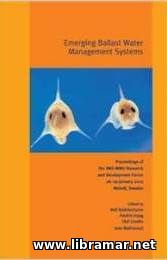 The present excellent collection of documents has been made of the selected papers and presentations of the IMO-WMU Global R&D Forum relating to the Emerging BWM Systems held some years back in Sweden. Nowadays, the great demand is there within the maritime industry for the development of the environmentally-friendly and also efficient BWM systems.
Taking this demand into account, the today's technological community has been dealing with the active developing of the various BWM systems to be able to cater to the emerging market of the ballast water technology, The systems in question have to undergo various applicable approval processes including the testing as per the established testing procedures, in compliance with the requirements of the BWM Convention plus the Guidelines. While several systems are currently under development or approval process, testing among the BWM system TF, i.e. test facilities worldwide shows the gaps in the harmonization and methodology.
This has significantly contributed to the confusion and lack of confidence among the people involved in the development of the subject systems, and also among the ship owners. Therefore, it is really imperative that the end-users of the BWM systems have enough confidence that consistent and reliable testing methodologies are applied.
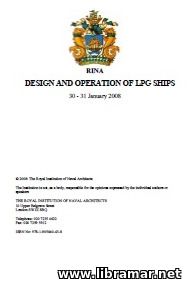 Here are the proceedings of the RINA-hosted international conference held in 2008 and dedicated to the operation and design of the ships transporting liquid petroleum gas. The papers selected for this publication cover design and operation of such ships, associated environmental risks together with the compliance for operation within inland waters. response of vessels to severe underwater shocks, market update, analysis of the supply-demand balance of the world liquid petroleum gas market and opportunities opening in the age of growing supply, fatigue assessment, supervision and professional training provided to the newbuilding site teams, various structural aspects of cargo tank design/construction, studies on support arrangement of cargo tanks, reliquefaction of the LPG cargo including design and operation of plants, etc.
The high prices for LPG slow the demand growth in many markets. Indian and Chinese import levels stopped their growth. At the same time, high energy costs stimulate the oil and gas projects and this would definitely bring about higher production of the LPG. Note that production in the Middle East region is ramping up, being driven by high crude oil production and new LNG-related projects. In the future, the LPG market is expected to be much more supply-driven...
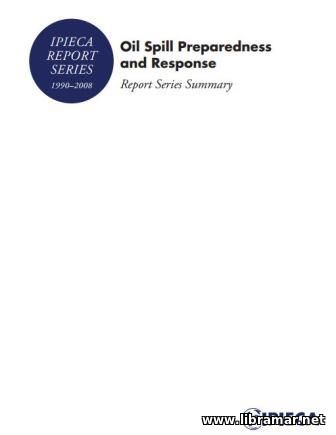 This publication contains all official reports issued by IPIECA organization on the oil spill incidents. It will be of interest not only to the people directly from the maritime shipping industry but also to the people working in or interested in the field of ecology and environment protections. The publication will provide them with a full overview of the major issues that could be referenced in preparation for the oil spills and in response to them at sea.
The main idea of the compilers of this document was to prepare a summary report that would be used by the people all around the world with the content being equally beneficial to everyone. There are total of seventeen separate oil spill reports included in the volume; in all of them particular emphasis was made on the biological impacts that the spills had. Some of the reports were prepared in close collaboration with the IMO and ITOPF.
The series itself focuses on the major aspects of the preparedness and response and we all shall recognized the utmost importance of being duly concentrated on the spill prevention at all times, knowing the seriousness of the consequences. The compact but informative guidance to oil spill compensation has also been included in the volume.
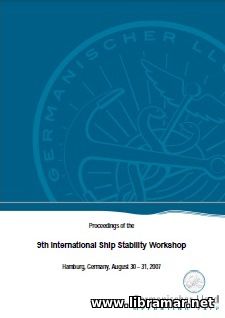 Here are some fragments of the opening speech... On behalf of the Local Organizing Committee of the 9th International Stability Workshop, I warmly welcome all the participants of the workshop to Hamburg. The workshop is being organized by Germanischer Lloyd, the well known and world respected classification society, with the support of the ISC (International Standing Committee) of the International Ship Stability Conference.
Former Stability Workshops have contributed greatly to the advancement of scientific treatment of ship safety in all its forms. The main declared aim of this workshop is to promote a full exchange of ideas, techniques, methodologies and best practice by providing a ground for the maritime profession to meet and discuss the stability of vessels and ocean vehicles, seeking ways for improving maritime safety. We would also like to thank our sponsor BMVBS, the German Ministry of Transport for their support. In addition to that, we would like to thank all the presenters, authors and participants, from all continents, for their contributions to this workshop.
Though this conference itself was held nearly ten years ago, the materials that are presented in this compilation shall still be considered actual and their importance is critically high to anyone who are interested in the developments in the field of assessment and control of the ship stability.
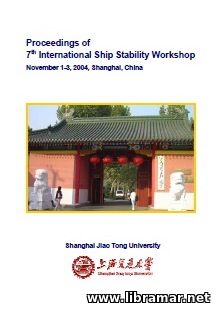 Some opening words... On behalf of the LOC of the Seventh International Ship Stability Workshop, we warmly welcome all the participants of the workshop to Shanghai. Ship has been a powerful tool for marine transportation in the human history. With the global development of economics, the amount of marine transportation around the world is even increasing now.
Among the various technical aspects in naval architecture, from an academic viewpoint, ship stability possesses its own unique and essential importance. I hope the present Workshop will provide a forum for a clear overview and deep discussions on the recent research progress in this aspect... The proceedings of that conference have been grouped in seven big sessions.
The first session mostly deals with the theoretical development in damage stability of the vessel, while the second session is dedicated to the damage survivability of stability. The next sessions cover the assessment of ship stability safety, some matters of the theoretical prediction if ship's intact stability, experimental investigation of intact stability, and the research on the ship dynamics with the water collected on decks and extreme waves. In addition to that, a separate session deals with the stability research in China.
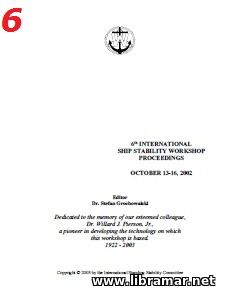 The International Workshops on Ship Stability are organized every year between the Stability Conferences STAB. They are guided by the International Standing Committee. This was the sixth Workshop in the series, after the Workshops in Glasgow, UK (1995), Osaka, Japan (1996), Hersonissos, Greece (1997), St. John's, Canada (1998) and Trieste, Italy (2001). The Workshop is, essentially, an invitation based scientific event.
It gathers those researchers and practitioners who are actively involved in stability subjects. It is the forum for in-depth discussion of all problems in the field of stability safety. This includes theoretical models, design intact stability, safety standards, operational elements of safety, damage stability, and regulatory aspects for all types of ships. The 6th International Ship Stability Workshop was hosted by Webb Institute in Glen Cove. New York. The program was coordinated by the Workshop Organizing Committee and the Session Organizers, while the organizational and administrative matters were in the hands of the Webb Local Committee.
The program of the sessions is listed in the Technical Program and the overall time table of the Workshop is presented in the Schedule. The papers presented here are grouped into sessions, as they were presented in the Workshop. The summary of the discussion during each session is presented as well.
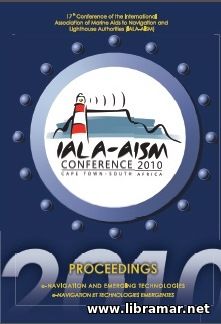 Here is the official document containing the proceedings of the Seventeenth Conference of the IALA-AISM held in Cape Town in 2010. Among the topics covered in the course of the conference there were virtual aids to navigation, portable pilot units, navigating eLoran, intelligent info systems for electronic navigation, new tech radars, application of 3D simulation system to the navigation aids, development of the four-season lighted buoy, recapitalization of the GPS network, Under Keel Management System etc.
Let us start with the article covering the virtual aid to navigation presented by Michael Skov from DaMSA (i.e. Danish Maritime Safety Authority). Virtual AIS as an aim to navigation shall not be considered as just another tool and shall be utilized successfully in numerous cases as by itself or together with other tools - for example, in cases of marking of fairways in some areas. DaMSA uses the data from AIS for numerous purposes and this presentation is intended to provide some examples.
It will mostly be focusing on the advantages and disadvantages of virtual aids to navigation - the text is supplemented with informative illustrations showing some of their benefits and also examples of the operational use of these tools in Danish waters...
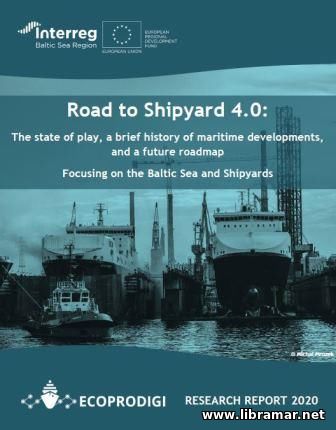 The content of the present report is based on the contributions provided by the several authors representing the most respected entities in the world of the international maritime shipping industry. It should be looked at as a result of the perfect collaboration. Numerous experts validated the original version of the report and, after that, the document was validated.
The document is aimed at the policy makers and other industry stakeholders, researchers and technology developers, and many other players. In fact, it could be treated as a sort of the starting point when discussing the future of the shipbuilding as it facilitates the cooperation of the parties involved. Note that the main emphasis has been put by the authors on the Baltic Sea region.
They have provided an excellent source of information about the current situation as well as the historical background and, of course, the future perspectives of the shipbuilding industry in the subject region. the document shall be read by the people willing to be kept updated in the recent developments and ongoing trends in the field of the shipbuilding and is intended to be useful to the professional shipbuilders and others engaged in the field.
|







